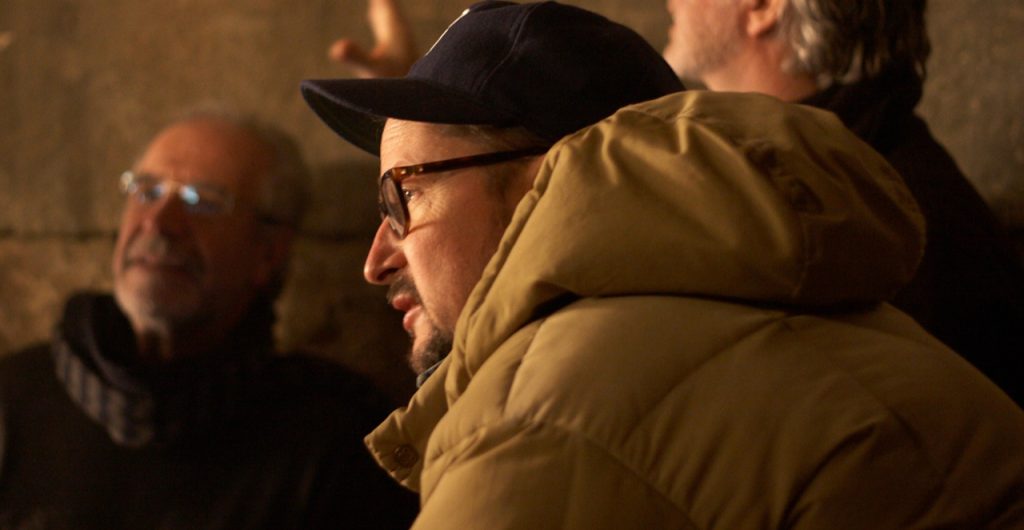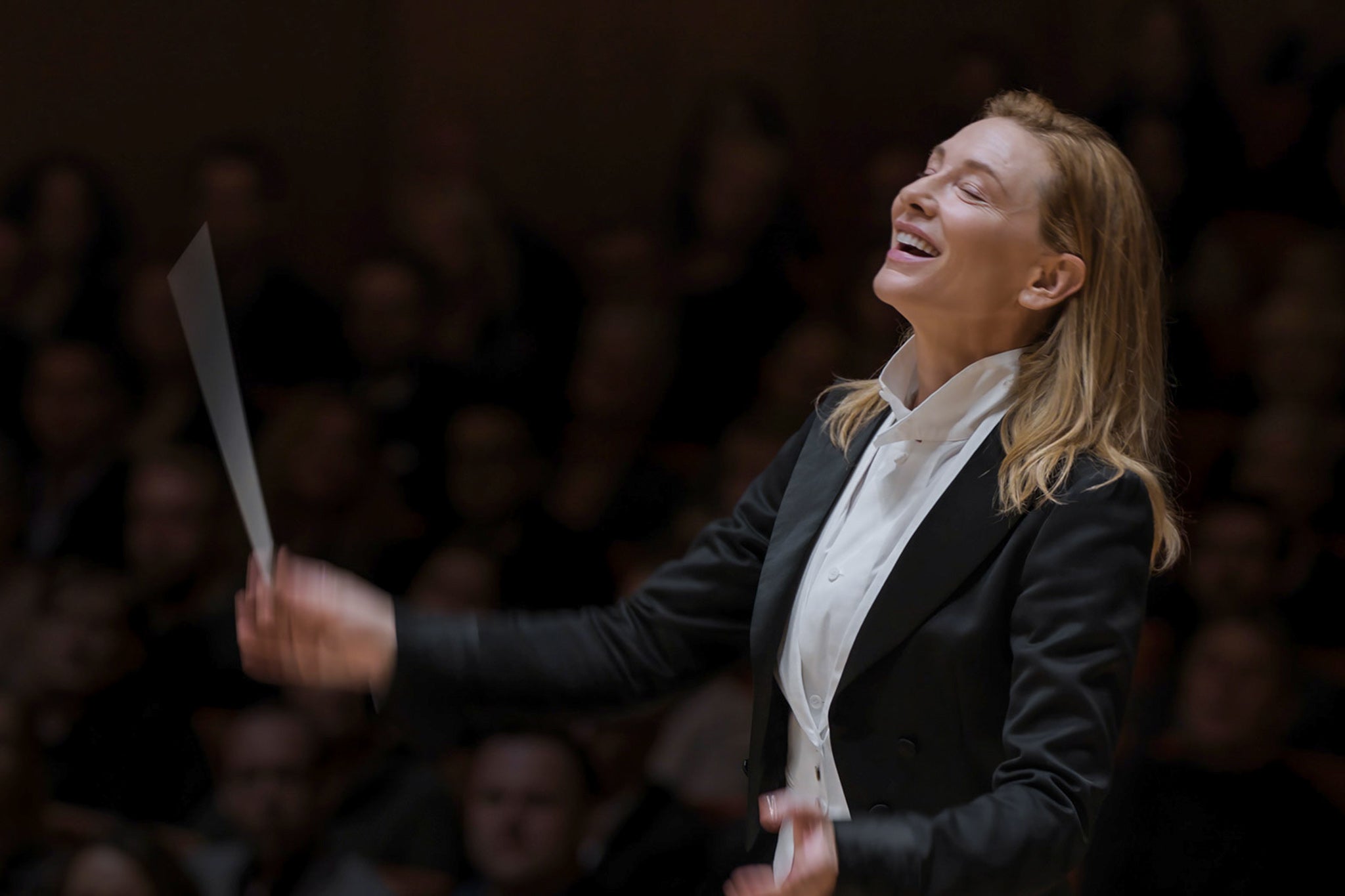“I never thought of Lydia Tár having anything to do with music,” declares writer/ director Todd Field (Little Children, In The Bedroom) about the famous conductor and composer. Tár first started making waves in the music scene when she became the innovative conductor of a major German orchestra.
In Fields’ film we first meet Lydia Tár (played by Cate Blanchett) “at the very heights of holding power and then losing it. It was really more about an examination of what power does to any individual who is handed that baton by others,” expands Field. The nature of building power and prestige is a complex dynamic built on alliances, ambition, and betrayals.
Tár climbed the musical career ladder for many noble reasons other than to control her fiefdom. She is a passionate, disciplined artist who loves classical music. Her meticulous definition of the role of time in music reinforces her dedication.
Her musical genius is unquestioned. As her accolades increase, so have her responsibilities in terms of managing her acquired power. “That power is starting to manage her because it’s obviously corrupting,” cautions Field. “When we meet Tár, she is someone that’s that’s thinking about legacy and trying to hold on to power and wondering if it’s worth it.” She’s climbed almost every mountain, written a book and is ostensibly at the peak of her career when the film opens.
She’s also approaching the age of fifty, so she’s wondering where her next success might lie. More importantly, as the years go by to make way for new entrants into the musical establishment, she may never reach another summit.
“I think her philosophy right now taking stock in certain things that allowed her to be three steps away from the summit and questioning what those things are. Philosophically she’s thinking, ‘I must hold power, I must keep power, and I must keep my instrument,’” Todd muses.
Lydia Tár is a textured, complicated polarizing figure. Can her unhealthy love for control be explained by her artistic genius or are there shadow characters in her personality emerging?
If you want to dance the mask, you must service the composer
Todd Field and Cate Blanchett’s aim was to create a character full of contrasts. “Our goal was to try to make her as three-dimensional as possible. We’re human beings, with a lot of contradictions in terms of our behavior. That is driven by many different things, our appetites, our allergies, our impulses… sometimes our drives are highly-disciplined, sometimes pathetic, and sometimes cruel.”
Lydia Tár is very accomplished and presents as confident and aloof – almost bordering on arrogant. Her world views on the rules of the musical establishment are valid, but she almost immediately violates them as if those said rules don’t apply to her. She embodies both contradiction and flaw. “That’s a very human thing,” advises Field. The screenwriter likens Tár’s attraction to the wonder and perfection that young children feel for their parents. Lydia, is in many respects, running a family and her children are growing up to realize she’s far from perfect.
Todd Field rejects the notion that characters should be defined as good or bad. “I see people that I want to spend time with and people that I don’t. Some of the people I want to spend time with in real life are other scoundrels, but they’re charming, they’re clever, and they’re witty… And just because I want to spend time with them, it doesn’t mean that I would trust them with my bank account,” Field continues. “And there are other people that I would trust with my bank account that I have no interest in spending time with that are utterly trustworthy, but they don’t particularly interest me.”
Many biopic films track the familiar rags to riches route followed by some tragic fall from grace. Maybe there’s a comeback. Maybe there isn’t. Tár meets her audience at her career peak in the film. She’s all business. “There is no time for a buildup. It’s not that kind of a narrative.” Field works on the story principle of getting in late and getting out early. “That’s the storytelling that makes sense for this story. I’m not a plotter. I’m a character man,” adds Field.

Todd Field. Photo by John Zast
Lydia Tár wears a seemingly impenetrable emotional armor. She’s passionate about her work, but her relationships with other humans appear to be dispassionate, clinical and transactional. This presents a unique challenge for Field and Blanchett to convince the audience to invest in her prickly and mercurial character.
“The page is practical, but the page is the page. Screenplays are meant to become living documents. That doesn’t happen until the performer arrives. And when you have an artist like Cate Blanchett, who’s much more than a performer, great things happen. She is a conductor, an interpreter of text and intent, and knows how to fill a moment,” beams Field.
Blanchett prepared meticulously well for the role. She learned to speak fluent German, learned to play the piano and even conduct an orchestra. She transformed into Lydia Tár from a place of fear. Todd recalls the moment when Cate first conducted the orchestra in his film. Cate was Lydia and Lydia was Cate. “It was that moment where Cate really understood Lydia’s character. She understood what the character had gained and she understood the stakes of what this character was going to potentially lose,” notes Field.
Who Is Lydia Tár?
Todd Field is more interested in presenting rather than rationalizing Lydia’s behavior. He spent a decade researching her career before he started to write his screenplay. “It was really more about trying to find the most interesting path for her, in a very specific period of time, without it turning into a procedural.”
He set up the rules for his story early on. “How do you get into a scene and not show result and imply result or let the audience catch up a couple of scenes later and without them feeling hoodwinked unnecessarily?”
Lydia is hardly and amicable perfectionist. We asked Todd Field what really drives her actions. “I don’t think confidence and arrogance are mutually exclusive. A display of arrogance is a mask that people wear, and oftentimes they’re trying to overcompensate for a feeling of insecurity. Because if you’re really secure, you’re not arrogant. If you’re really secure, you’re more imperious,” he articulates.
“That outward behavior in terms of how Tár interacts with people partly stems from her own comportment, probably what she had to fight as a woman. and as a gay woman, coming up. We’ve never had anyone like Lydia Tár running a major German orchestra as a principal conductor ever, or any of the so-called big five orchestras in the US. So it’s an utter fiction that she could do this,” continues Field.
Lydia Tár is not all selfish either. “She’s also interested in pulling the ladder up behind her. In one way she’s talking about how she helps other female conductors, but she also dismisses the idea that gender even matters… and of course it matters. There are huge inequities in her profession as kind of a self-serving narrative and I think she’s taken on a lot of the traits of what she sees as white patriarchal power, a historic power in that milieu that is undeniably seductive and attractive because it’s about being God,” Field elaborates. The establishment and her acolytes also enable Lydia Tár to manifest these traits.
It was important for Todd Field not to create a film on the legend of Lydia Tár, but an honest portrayal of her. “She’s very real for me. The idea is to try to be as fair as one can with as little bias as possible.”
Despite her tough shield, Lydia Tár is human beneath it all. Away from her conducting altar, Tár’s life consists of a long-term relationship with Berlin’s concertmaster Sharon Goodnow (Nina Hoss). The couple raise their adopted Syrian daughter, Petra (Mila Bogojevic) in a modest house. “I think she truly loves her partner Sharon even though we see that her behavior with her is messy, to say the least,” adds Field. “I think she also deeply loves Petra and she sees opportunity in that.”
Lydia faces sexual harassment charges and is well-known for her purported affairs. Sharon, however, chooses to ignore them, not because she enjoys playing the victim, but she sees their relationship as a means to an end by remaining as Berlin’s power couple. Both Lydia and Sharon are complicit in making and breaking their relationship rules.
Lydia likely had a rough childhood and was forced to grow up quickly in the school of hard knocks. “I think she was probably bullied as a child, which is why that scene in her daughter’s school is a scene she’s been waiting to have with that bully for a very long time since she was, you know, five or six years old.” She dusts herself off even after being assaulted as an adult and continues with business as usual in her class. But the emotional scars linger.
Tár toggles the extremes of passion and obsession. “I think that she’s conflicted about because on the one hand, that any conductor that also composes, I think that’s always a very tough dinner table. Because on the one hand, you’re celebrated as a conductor, but you’re not quite as celebrated as a composer,” continues Field. “I think she’s struggling with her own sense of identity.” She’s admirably passionate about her music but she gets in her own way because of her outsized ego.
Tár’s sense of authoritarian values escalates as the film progresses. It stems from her patriarchal heroes who assumed notoriety and held on to it. So too, Lydia sees herself as a hero of sorts. “It’s almost a Viking idea, like he’s Thor or a Greek god throwing a thunderbolt to mere mortals.”
This is not a democracy – Lydia Tár
Paradoxically, that’s when things changed in Germany when the Principle Conductor for life tradition was challenged in favor of a vote, even to Tár’s detriment when she loses her position.
In order to offset the stodgy seriousness of German orchestras, Tár contains moments of levity. “I think there’s a lot of humor in the film, When we premiered in Italy, I didn’t hear any laughter. They way they engaged and read the film was very, very different than other screenings. I’m always surprised that where people laugh or don’t laugh at the film. I think there’s humor implicit throughout the script,” concludes Field.
